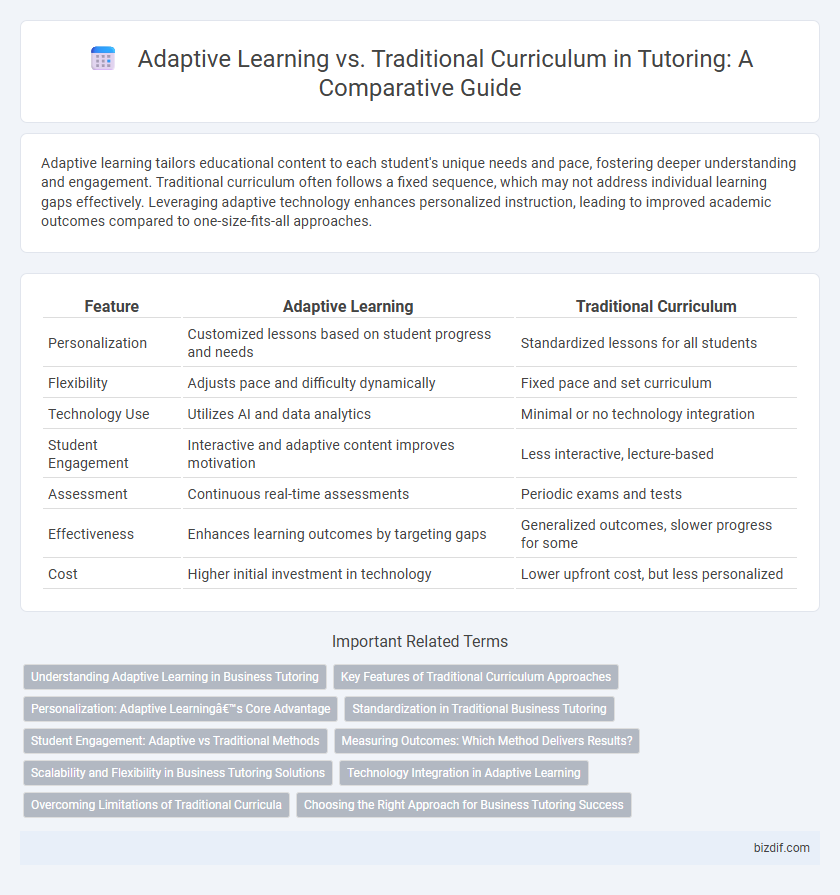Adaptive learning tailors educational content to each student's unique needs and pace, fostering deeper understanding and engagement. Traditional curriculum often follows a fixed sequence, which may not address individual learning gaps effectively. Leveraging adaptive technology enhances personalized instruction, leading to improved academic outcomes compared to one-size-fits-all approaches.
Table of Comparison
| Feature | Adaptive Learning | Traditional Curriculum |
|---|---|---|
| Personalization | Customized lessons based on student progress and needs | Standardized lessons for all students |
| Flexibility | Adjusts pace and difficulty dynamically | Fixed pace and set curriculum |
| Technology Use | Utilizes AI and data analytics | Minimal or no technology integration |
| Student Engagement | Interactive and adaptive content improves motivation | Less interactive, lecture-based |
| Assessment | Continuous real-time assessments | Periodic exams and tests |
| Effectiveness | Enhances learning outcomes by targeting gaps | Generalized outcomes, slower progress for some |
| Cost | Higher initial investment in technology | Lower upfront cost, but less personalized |
Understanding Adaptive Learning in Business Tutoring
Adaptive learning in business tutoring customizes educational content based on individual learner performance, leveraging data analytics to identify strengths and weaknesses. This personalized approach enhances skill acquisition and improves retention compared to traditional curricula, which follow a fixed, one-size-fits-all syllabus. The integration of real-time feedback and dynamic content adaptation drives more efficient learning outcomes and better prepares students for evolving business challenges.
Key Features of Traditional Curriculum Approaches
Traditional curriculum approaches emphasize fixed, standardized content and a linear progression through predetermined subjects. Instruction often relies on uniform assessments and teacher-led lessons that prioritize memorization and repetition. This model typically lacks flexibility to accommodate individual learning paces and styles, resulting in a one-size-fits-all educational experience.
Personalization: Adaptive Learning’s Core Advantage
Adaptive learning leverages real-time data analytics and AI algorithms to tailor educational content to each student's unique needs, enhancing engagement and retention rates. Unlike traditional curriculum models with fixed pacing and uniform material, adaptive platforms adjust difficulty levels and learning paths dynamically, fostering a deeper understanding. This personalization not only boosts academic performance but also addresses diverse learning styles and paces, creating a more effective and inclusive tutoring experience.
Standardization in Traditional Business Tutoring
Standardization in traditional business tutoring follows a fixed curriculum designed to meet general learning objectives, often lacking flexibility to address individual student needs. This uniform approach emphasizes consistent content delivery and assessment methods, which may limit personalized learning pathways and adaptability. As a result, the standardized curriculum can struggle to accommodate diverse learning paces and styles compared to adaptive learning systems.
Student Engagement: Adaptive vs Traditional Methods
Adaptive learning methods significantly boost student engagement by personalizing content to individual learning styles and paces, resulting in higher motivation and improved retention. Traditional curriculum often relies on uniform instruction, which may not address diverse student needs, leading to disengagement and lower participation. Data shows that adaptive platforms increase active learning time by up to 35%, enhancing focus and academic performance across various subjects.
Measuring Outcomes: Which Method Delivers Results?
Adaptive learning uses data-driven algorithms to personalize instruction based on individual student performance, resulting in more precise measurement of learning outcomes. Traditional curriculum relies on standardized assessments that may overlook diverse learner needs, often providing less detailed metrics on progress. Research shows adaptive learning typically delivers higher student engagement and improved achievement by constantly adjusting content to optimize results.
Scalability and Flexibility in Business Tutoring Solutions
Adaptive learning technologies enable tutoring businesses to scale efficiently by tailoring content to individual student needs, reducing manual intervention and maximizing resource utilization. Traditional curricula often lack flexibility, making it challenging to customize lessons for diverse learners and adapt to varying paces, which limits scalability in expanding tutoring operations. Implementing adaptive learning solutions enhances business agility, supports personalized learning paths, and facilitates the scalable delivery of high-quality tutoring services across multiple locations or platforms.
Technology Integration in Adaptive Learning
Adaptive learning harnesses advanced technology such as AI algorithms and data analytics to personalize tutoring sessions based on individual student performance and learning paces. Unlike traditional curriculum, which follows a fixed, linear structure, adaptive platforms dynamically adjust content difficulty and presentation, promoting efficient knowledge retention. This integration of technology enhances engagement and supports targeted interventions, leading to improved academic outcomes.
Overcoming Limitations of Traditional Curricula
Adaptive learning tailors educational content to individual student needs, addressing the one-size-fits-all limitation of traditional curricula that often neglect diverse learning paces and styles. By integrating real-time data analytics, adaptive systems personalize instruction, enhancing engagement and mastery of concepts. This targeted approach significantly improves learning outcomes compared to the static, uniform progression of conventional teaching methods.
Choosing the Right Approach for Business Tutoring Success
Adaptive learning tailors educational content to individual student needs by utilizing real-time data and personalized feedback, significantly improving engagement and retention in business tutoring. Traditional curriculum follows a fixed, standardized structure that may not address diverse learning paces but ensures comprehensive coverage of core business concepts. Selecting the right approach depends on the tutoring goals, student profiles, and scalability requirements to maximize learning outcomes and business success.
Adaptive Learning vs Traditional Curriculum Infographic

 bizdif.com
bizdif.com